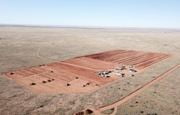Scatec ASA, a leading renewable energy solutions provider, is starting construction of the three Kenhardt projects in the Northern Cape Province of South Africa under the Risk Mitigation Independent Power Producer Procurement Program (RMIPPPP) after reaching financial close.
Once operational the project will have a total solar capacity of 540 MW and battery storage capacity of 225MW/1,140MWh, and provide 150 MW of dispatchable power under a 20-year Power Purchase Agreement to the Kenhardt region – in a country that is currently suffering from power shortages.
“Achieving commercial and financial close for the Kenhardt projects shows true commitment by our Scatec team and partners. This project is a first of its kind and will be one of the world’s largest solar and battery facilities. We are now looking forward to starting construction of this unique and exciting project, which will be a major contribution to South Africa’s economy and green energy sector,” says Scatec CEO Terje Pilskog.
“This is an important milestone in the procurement of renewable energy and proves that the sector can be relied upon to deliver much-needed electricity capacity to the grid,” adds Jan Fourie, General Manager of Sub-Saharan Africa.
The project will be the largest investment in Scatec’s history with a total capex of approximately ZAR 16.4 billion ($962 million) to be financed by equity from the owners and ZAR 12.4 billion ($727 million) in non-recourse project debt. The debt will be provided by a group of Lenders which includes The Standard Bank Group as arranger and British International Investment. The Kenhardt projects are funded in local currency.
Scatec will own 51% of the equity in the project, with H1 Holdings, our local Black Economic Empowerment partner owning 49%. Scatec will be the Engineering, Procurement and Construction (EPC) provider and provide Operation & Maintenance as well as Asset Management services to the power plants. The value of Scatec’s Development and EPC contract for the project is approximately ZAR 13.7 billion ($800 million).

